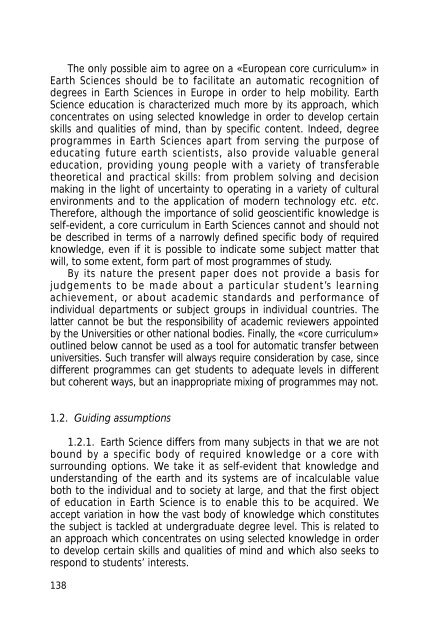Final Report Pilot Project - Relaciones Internacionales de la ...
Final Report Pilot Project - Relaciones Internacionales de la ...
Final Report Pilot Project - Relaciones Internacionales de la ...
Create successful ePaper yourself
Turn your PDF publications into a flip-book with our unique Google optimized e-Paper software.
The only possible aim to agree on a «European core curriculum» in<br />
Earth Sciences should be to facilitate an automatic recognition of<br />
<strong>de</strong>grees in Earth Sciences in Europe in or<strong>de</strong>r to help mobility. Earth<br />
Science education is characterized much more by its approach, which<br />
concentrates on using selected knowledge in or<strong>de</strong>r to <strong>de</strong>velop certain<br />
skills and qualities of mind, than by specific content. In<strong>de</strong>ed, <strong>de</strong>gree<br />
programmes in Earth Sciences apart from serving the purpose of<br />
educating future earth scientists, also provi<strong>de</strong> valuable general<br />
education, providing young people with a variety of transferable<br />
theoretical and practical skills: from problem solving and <strong>de</strong>cision<br />
making in the light of uncertainty to operating in a variety of cultural<br />
environments and to the application of mo<strong>de</strong>rn technology etc. etc.<br />
Therefore, although the importance of solid geoscientific knowledge is<br />
self-evi<strong>de</strong>nt, a core curriculum in Earth Sciences cannot and should not<br />
be <strong>de</strong>scribed in terms of a narrowly <strong>de</strong>fined specific body of required<br />
knowledge, even if it is possible to indicate some subject matter that<br />
will, to some extent, form part of most programmes of study.<br />
By its nature the present paper does not provi<strong>de</strong> a basis for<br />
judgements to be ma<strong>de</strong> about a particu<strong>la</strong>r stu<strong>de</strong>nt’s learning<br />
achievement, or about aca<strong>de</strong>mic standards and performance of<br />
individual <strong>de</strong>partments or subject groups in individual countries. The<br />
<strong>la</strong>tter cannot be but the responsibility of aca<strong>de</strong>mic reviewers appointed<br />
by the Universities or other national bodies. <strong>Final</strong>ly, the «core curriculum»<br />
outlined below cannot be used as a tool for automatic transfer between<br />
universities. Such transfer will always require consi<strong>de</strong>ration by case, since<br />
different programmes can get stu<strong>de</strong>nts to a<strong>de</strong>quate levels in different<br />
but coherent ways, but an inappropriate mixing of programmes may not.<br />
1.2. Guiding assumptions<br />
1.2.1. Earth Science differs from many subjects in that we are not<br />
bound by a specific body of required knowledge or a core with<br />
surrounding options. We take it as self-evi<strong>de</strong>nt that knowledge and<br />
un<strong>de</strong>rstanding of the earth and its systems are of incalcu<strong>la</strong>ble value<br />
both to the individual and to society at <strong>la</strong>rge, and that the first object<br />
of education in Earth Science is to enable this to be acquired. We<br />
accept variation in how the vast body of knowledge which constitutes<br />
the subject is tackled at un<strong>de</strong>rgraduate <strong>de</strong>gree level. This is re<strong>la</strong>ted to<br />
an approach which concentrates on using selected knowledge in or<strong>de</strong>r<br />
to <strong>de</strong>velop certain skills and qualities of mind and which also seeks to<br />
respond to stu<strong>de</strong>nts’ interests.<br />
138


